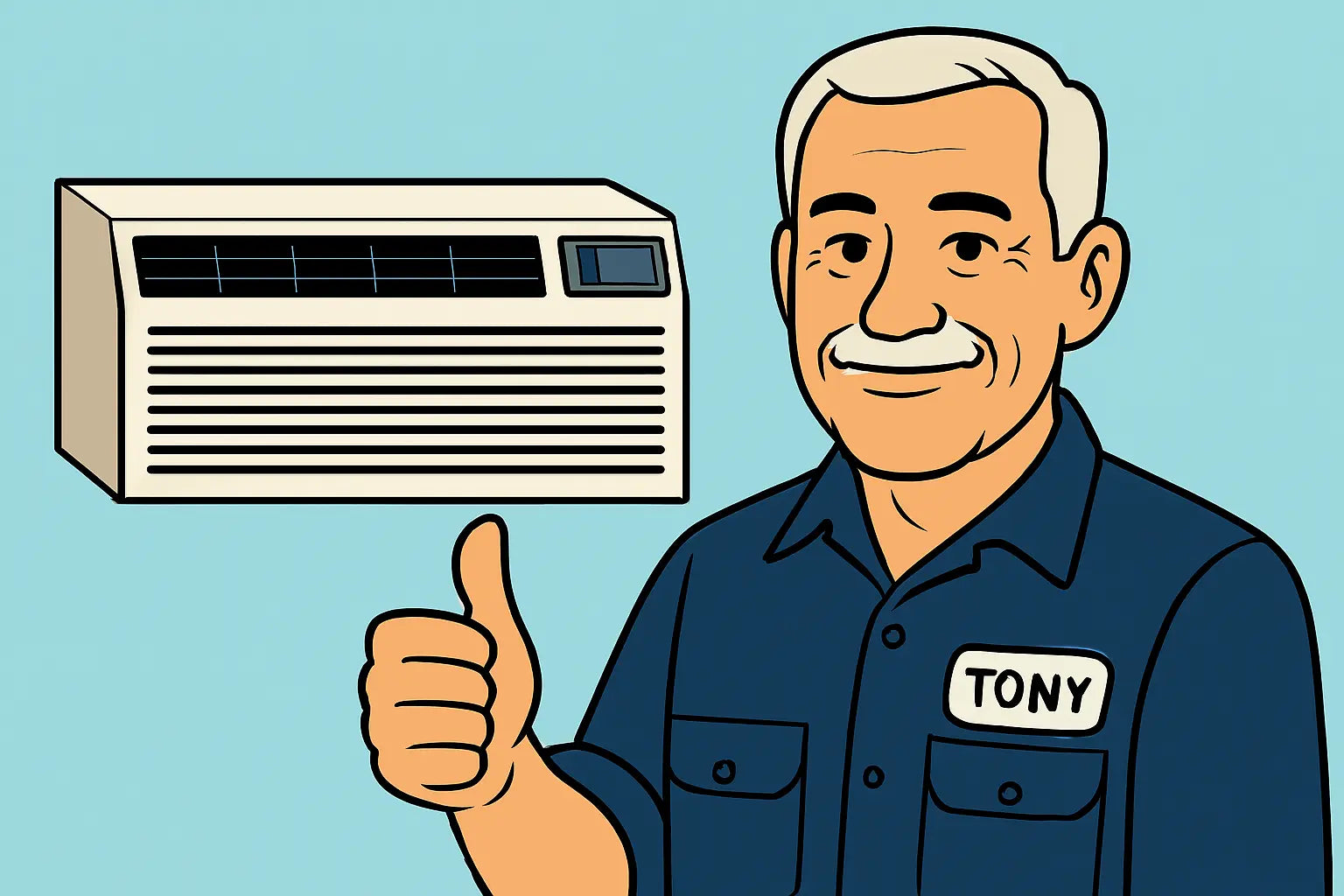🛠️ Introduction: Tony’s PTAC Troubleshooting Corner
Hey, Tony Marino here again! So, you’ve got your Amana Distinctions 14,700 BTU PTAC unit with heat pump and 3.5 kW electric heat backup installed, but something’s not right. Maybe it’s not cooling, maybe it’s making weird noises, or perhaps the electric heat backup isn’t kicking in when you need it.
Don’t sweat it. I’ve seen it all. In this guide, I’ll walk you through the most common PTAC issues and show you exactly how to troubleshoot them like a pro. You’ll be back to comfy temps in no time. Let’s dig in! 💪
🔹 Section 1: PTAC Won’t Power On
1.1 Check Your Power Source
The first thing to do is the obvious: make sure your PTAC is getting power.
-
Confirm the breaker is on.
-
Ensure the unit is plugged in securely.
-
Check for tripped GFCI outlets if applicable.
For a detailed guide on electrical basics for PTAC units, check out HVAC.com’s Electrical Troubleshooting Tips.
1.2 Reset the Unit
Sometimes a simple reset fixes startup issues:
-
Turn the unit off at the breaker.
-
Wait 30 seconds.
-
Turn it back on and try powering up.
This can clear minor electrical glitches or internal lockouts. For step-by-step visuals, see PTAC Reset Instructions.
🔹 Section 2: PTAC Not Cooling or Heating Properly
2.1 Inspect the Settings
Make sure your PTAC is in the correct mode (cool, heat, or fan). Sounds simple, but it’s a surprisingly common oversight.
2.2 Check Filters and Airflow
Clogged filters restrict airflow and reduce efficiency. Clean or replace them monthly. For a guide on filter maintenance, see Energy Star PTAC Care Tips.
2.3 Check Refrigerant Levels
If cooling performance is low, refrigerant could be low. This requires a certified HVAC technician to service. Don’t try to recharge it yourself—safety first!
🔹 Section 3: Strange Noises
3.1 Identify the Type of Noise
-
Rattling: Could be loose screws or a misaligned sleeve.
-
Buzzing: Possibly electrical or fan issues.
-
Grinding: Likely worn fan bearings or internal components.
3.2 Inspect Components
Turn off the unit, remove the front panel, and visually inspect:
-
Fan blades for obstructions
-
Screws and mounting brackets for looseness
-
Any signs of wear or damage
For more detailed diagnostics, check HVAC.com’s Guide to PTAC Noise Troubleshooting.
🔹 Section 4: Water Leaks
4.1 Check the Drainage System
Most leaks happen when the drainage system is blocked. Clean the drain pan and pipes regularly.
4.2 Inspect Seals and Windows
Ensure the unit is properly sealed in its sleeve or window. Worn gaskets or caulk gaps can let water in, especially during high humidity.
4.3 Condensation Tips
Running the fan in “fan-only” mode for a few minutes after cooling cycles can reduce condensation buildup.
🔹 Section 5: Electric Heat Backup Issues
The 3.5 kW electric backup is your go-to during cold snaps. Common issues:
-
Heat Not Engaging: Check the mode setting and thermostat.
-
Tripped Breaker: The heater draws significant current; ensure the breaker can handle it.
-
Uneven Heating: Could be airflow restriction; clean filters and vents.
For advanced electric heat troubleshooting, see HVAC.com Electric Heater Maintenance Tips.
🔹 Section 6: Pro Tips for Ongoing Performance
-
Monthly Inspections: Filters, vents, and drainage.
-
Seasonal Maintenance: Coil cleaning, lubrication, and gasket checks.
-
Keep a Maintenance Log: Helps identify recurring issues and supports warranty claims.
For a comprehensive PTAC maintenance schedule, refer to the Amana PTAC Service Instructions Manual.
🏁 Conclusion: Tony’s Troubleshooting Wisdom
Alright, folks, Tony Marino here—signing off with some real talk. Troubleshooting your Amana Distinctions 14,700 BTU PTAC unit doesn’t have to be scary. Start with the basics: check power, inspect filters, confirm settings, and then move on to deeper diagnostics.
Remember, if something feels beyond your comfort level—like refrigerant or major electrical work—call a licensed professional. Otherwise, follow these steps, and your PTAC unit will keep you cool in summer and cozy in winter.
Curious about the parts in this unit? Visit: The Best Guide to Upgrading and Replacing Parts in Your Amana Distinctions 14,700 BTU PTAC.
Stay safe, keep it maintained, and enjoy your comfort! 🛠️🔥❄️
- Tony the Trusted Tech







